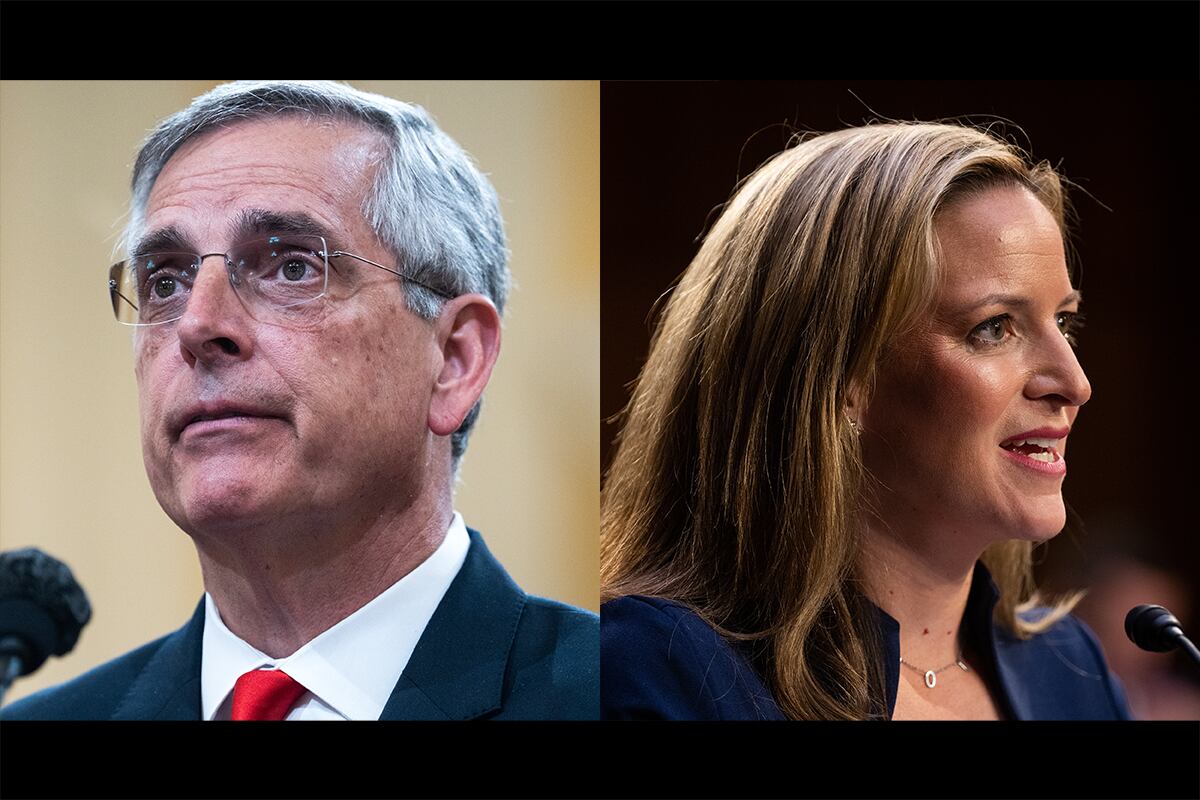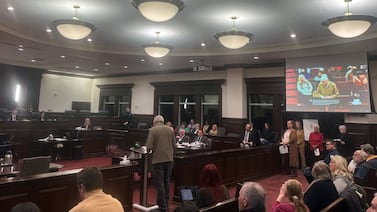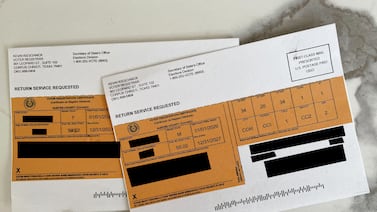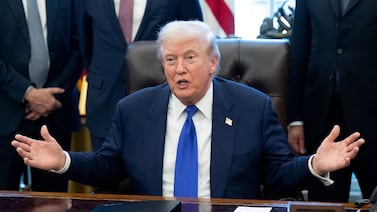Votebeat is a nonprofit news organization reporting on voting access and election administration across the U.S. A version of this post was originally distributed in Votebeat’s free weekly newsletter. Sign up to get it delivered to your inbox every Saturday.
Hi, y’all,
I feel like this newsletter is the one that will finally justify that greeting, which I’ve been inflicting upon you, dear reader, since the very first Votebeat newsletter: It’s about the Texas Tribune festival.
Last week, as part of the festival, Votebeat hosted a conversation between Michigan Secretary of State Jocelyn Benson, a Democrat, and Georgia Secretary of State Brad Raffensperger, a Republican. On the table: how to take politics out of election administration. That is, it seems, the impossible question that haunts us all on a daily basis.
Still, it was one of the most rewarding hours of my on-the-job life in many months.
And I know! I know that I seem extremely Pollyanna. I show up to work every single day for a newsroom that covers election administration because even though the public discourse over this surpassed “bonkers” a long time ago, I still believe it’s possible to give the public good information about elections and have that make a difference. Here’s why I mean that:
The talk was midmorning on a Saturday at St. David’s church in downtown Austin. I wasn’t convinced it would be a popular choice. There was a competing panel called “Florida Man” just down the hall featuring a panel discussion about presidential candidate and Florida Gov. Ron DeSantis at the same time. Popular Cabinet spouse Chasten Buttigieg was doing a book signing across the street, and Anthony Scaramucci and Katie Couric were recording (separate) podcasts in front of live audiences.
I was – in the most wonderful way possible – flat wrong. The pews were full, and a few people who’d not managed to sit down prior to start time were bunched in corners and along the sides. And the audience was engaged in a way few audiences are. They understood the issues and asked firm, well-researched questions about election administration. They appeared to be soaking in every single word Benson and Raffensperger offered in response.
I knew we were in for a fun hour when I asked those in the audience to raise their hands if they’d ever served as a poll worker. Around half the hands in the room flew up, starting a ripple of happy applause. During the Q&A, a man walked to the microphone not to ask a question but simply to encourage everyone in the room to volunteer on Election Day. More applause.
When we wrapped, audience members lined up to speak to the two secretaries — shaking hands, asking them to sign books — while continuing to ask them detailed questions. I’d never watched anyone pause from asking a question about voter list maintenance in order to snap a selfie with a state-level bureaucrat, but now I have.
There were, of course, less fun bits.
Benson, for example, shared a story she hadn’t shared before: In early 2021 — after Raffensperger found himself the center of a massive national story — she’d reached out to her fellow secretaries of state to get them to sign a letter of support for him, explaining they would have made the same decisions Raffensperger made to resist Donald Trump’s pressure. “I couldn’t find a single Republican to sign the letter,” she said.
Raffensperger lamented the work Georgia and every other state will now have to do to continue to perform cross-state voter list maintenance with the states that have pulled out of ERIC, a previously uncontroversial multistate compact. What used to be an easy, secure program with ready-made tools for such work now requires individual agreements with each of these states to do analysis that likely will not be of the same quality.
These are big things that point to big problems. Both Raffensperger and Benson were clear-eyed about this, and about the damage the division and mistrust is doing to democracy as a whole.
By the end of the hour, we, of course, did not arrive at an answer for how to take the partisanship out of election administration. But the audience made me a little more hopeful that it’s possible.
Back Then
For this week’s history lesson, I offer a completely unedited excerpt from The Oklasodak, a weekly newspaper in San Benito, Texas (way down at the bottom tip of the state). It was published in November of 1916 but could have been published this year.
“Those in charge of the voting places, the attending notaries, the postmaster, the clerk selling postage, all seemed to harmoniously work to one common end: the prompt dispatch of more than five hundred ballots back to South Dakota so as to arrive there and be counted before the polls closed on election day evening. Mails that came into San Benito late Friday evening brought most of the delinquent ballots, but some voters were disappointed. Somebody had slipped a cog and several irate citizens cussed out their county auditors for failing to promptly respond to their applications for ballots. Just a few arrived here too late.”
If you’re wondering why a bunch of people from South Dakota were in Texas in 1916, it was because that summer the 4th South Dakota Infantry of the National Guard was sent to San Benito Texas “to defend the U.S. border against raids by Pancho Villa’s Army during the Mexican revolution.” The men returned home in March of 1917.
New From Votebeat
From Votebeat Arizona: Media network paid by GOP groups is behind deluge of election records requests
In Other Voting News
- The U.S. Supreme Court refused to block a ruling by a panel of federal judges mandating a new court-drawn political boundary map for Alabama’s elections, denying a request from the state to continue using a map that the lower court found violated an earlier order to create a second majority-Black district, or something “close to it.” The court-appointed special master has submitted three potential maps to the court, which is scheduled to hold a hearing in the long-running redistricting case on Oct. 3.
- In other redistricting news, a federal trial began over Florida’s congressional map, which plaintiffs allege Republicans intentionally drew to dismantle a district favoring Black candidates, according to the Associated Press. In New Mexico, the AP reports that a state judge is preparing for a trial over allegations that Democrats ignored traditional districting criteria for political gain. An appeals court halted the redrawing of Louisiana’s congressional map for now, though the case continues. Redistricting decisions from courts around the country have the potential to affect the balance of power in the U.S. House of Representatives after the 2024 election.
- This long read from the Houston Chronicle from the country’s smallest county - tiny Loving County, Texas - lays out how the community is mired in a bitter fight over whether former residents who still claim to live there can continue to cast ballots, a murky question under state law.
- Roughly half of Americans in an 11-state Western United States region have a new chief local elections officer since the 2020 election, new research by the nonprofit nonpartisan group Issue One found. The region includes high-profile swing states such as Arizona and Nevada. Read Issue One’s report here and a story from NPR about it here.
- MyPillow CEO Mike Lindell, a leading promoter of election conspiracy theories, told former White House advisor Steve Bannon that American Express’ decision to take his company’s line of credit from $1 million to $100,000 “cripples” the company. Lindell said the company has largely moved to direct-to-consumer sales, blaming “cancel culture” in the wake of his election allegations, according to Newsweek.
- President Joe Biden delivered a high-profile speech on democracy in Phoenix, Arizona last week, warning about the threat to democracy posed by his predecessor, former President Donald Trump, who is now campaigning to run against him in 2024. “There’s an extremist movement that does not share the basic beliefs in our democracy,” he said. Votebeat Arizona’s Jen Fifield wrote about the speech in our Arizona newsletter (sign up here).
Jessica Huseman is Votebeat’s editorial director and is based in Dallas. Contact Jessica at jhuseman@votebeat.org.




